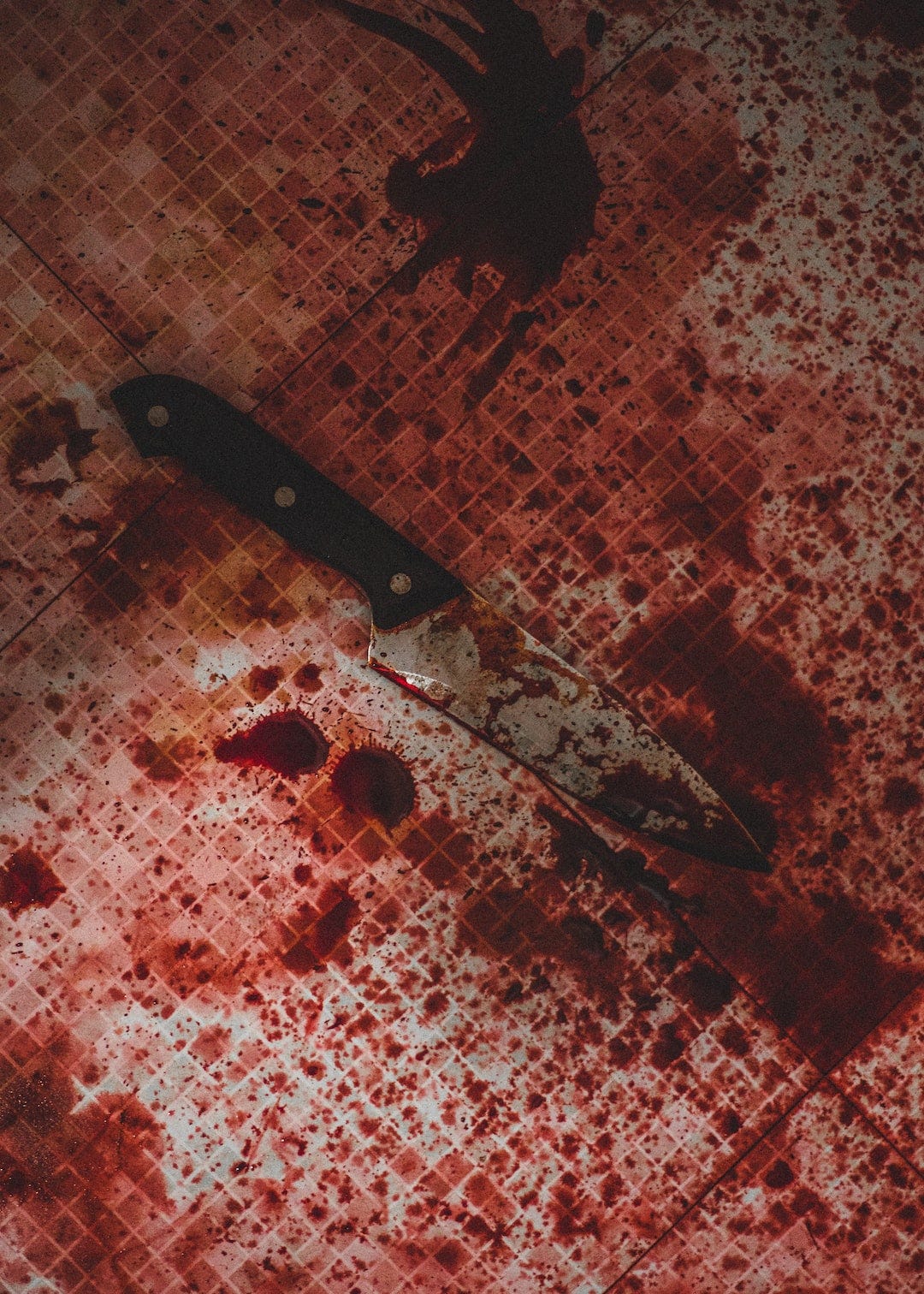
Amid blinking lights, the face of a dazed young man comes into focus. His face and school uniform are smeared with blood. The scene ends abruptly. The young man, his faced scrubbed clean and now wearing a bloodless shirt, sits in an interrogation room. As a policewoman asks, quite rhetorically, if he hasn't been at this school for too long, an image of the young man passing through the ruins of his old school flashes on screen. Only for four months, he says.
The scene switches once more. The young man, with blood all over him, is again walking in a daze. He pushes the glass door leading to the pool and sees people in the distance. He presses his left hand on the glass and watches it slide down leaving a bloody imprint, his eyes following the movement of his hand, as if uncomprehending, then he looks down on both bloody hands in fear and confusion.
The people he saw in the distance, one of them the policewoman, notice him and approach. More policemen approach from behind him and as they attempt to grab him, the policewoman, her expression compassionate, motions them to stop. As she talks to him, the scene ends and "E-L-I-T-E" in bright red slides in from both sides of the screen against a stark black background.
All that in two minutes and thirty seconds. Enough to catch my full attention and more than enough for me to decide that Elite was something I must watch. It reminded me of How to Get Away With Murder. The discovery of a dead body in the present, the why of the murder building up in a series of flashbacks that alternate with the progression of present events. What I didn't anticipate was that I'd watch all eight episodes of Elite in one night.
Unlike How to Get Away With Murder which is set in a law school, Elite takes place in an exclusive high school in Spain. A public school building collapsed and, in an attempt to assist the displaces students, three scholarships to Las Encinas were handed out. The scholarships went to Samuel (Itzan Escamilla), Nadia (Mina El Hammani) and Christian (Miguel Herrán) who all come from working class families.
Samuel is a part-time waiter whose brother Nano (Jaime Lorente) has just been released from prison. Nadia is of Palestinian descent and her parents are staunch traditionalists who still believe in arranged marriages and absolute filial piety. Christian, best friend of Nano, runs with a fast crowd.
The student population of Las Encinas, sons and daughters of Spain's elite, do not receive them well. They are taunted, mocked and humiliated.
There is Guzman (Miguel Bernardeau), the alpha male to whom Ander (Arón Piper) and Polo (Álvaro Rico) look up to, and his sister, Marina (María Pedraza), whose sweet demeanor hides a self-destructive nature and a tragic past. Their father designed the ill-fated public school building that collapsed, the tragedy that brought Samuel, Nadia and Christian to Las Encinas.
Then, there's the passive-aggressive Lu (Danna Paola), Guzman's not-girlfriend and the manipulative Carla (Ester Expósito), Polo's girlfriend since they were 12.
On the other side of the economic fence are Nadia's brother, Omar (Omar Ayuso), a drug dealer and closet homosexual, and Samuel's ex-con brother Nano whose disruptive nature serves as catalyst for the inevitable clash between the elite and the underprivileged and, eventually, murder.
A friend remarked that "This show [Elite] makes Gossip Girl or Cruel Intentions seem like a Disney princess movie." I never saw Gossip Girl; I loved Cruel Intentions (did you know that it was based on Les Liaisons Dangereuses written by Pierre Choderlos de Laclos in 1782?). Yes, there is some parallelism there but I find more common denominators between Elite and How to Get Away With Murder. Among them:
1. Murder (of course);
2. Substance abuse;
3. Homosexuality and homosexual sex;
4. The effect on children of criminal activities of wealthy parents;
5. The fabulous clothes
The main difference is that Elite is not judgmental — not of the teenaged protagonists anyway. They are heroes / heroines and villains at the same time — neither all good nor all bad. They're just teenagers trying to cope with life with the tools available at their disposal.
Elite goes a step farther too by incorporating religious culture in the story. Muslims in a white man's world who are desperare to preserve their culture while, at the same time, trying to adapt. It's a sensitive theme to be sure and difficult to treat without seeming like the white man is continually looking down on them. But Elite manages although in a limited sense.


